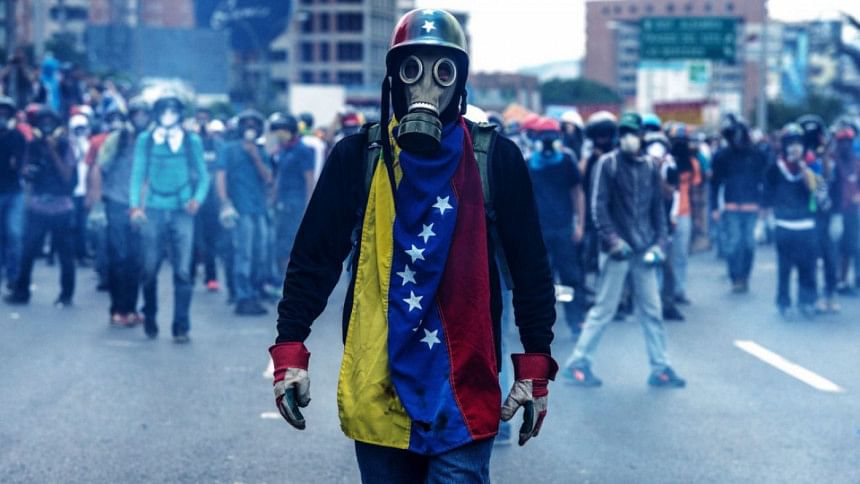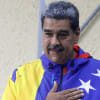Venezuela's Dutch disease syndrome

The political and economic situation of Venezuela has been dominating world media for quite some time now. What happened to this petro-state with the largest oil reserve in the world? The country is afflicted with total economic mismanagement, hyperinflation, corruption, soaring hunger, disease, crime, massive emigration and above all political instability due to authoritarian style of government.
One has to go back to Venezuela's recent politico-economic history. Oil has shaped Venezuela's politics and dominated its economy ever since vast oil reserves were discovered in 1922. Two reasons seem responsible for Venezuela's woes. The first is the Bolivarian Revolution and second the Dutch disease. Both of these are interlinked with Venezuela's petrodollars.
After coming to power in 1999, left-leaning President Hugo Chavez, buoyed with the prospect of huge oil revenues, went for Bolivarian Revolution, an elaborate socialist programme. The social programmes called "missions' sought to reduce social disparities. Chavez proclaimed that the military was not a force of popular repression rather a force for development and security. Soldiers were thus engaged in door-to-door anti-poverty activities, mass vaccinations, food distribution in slum areas, education, etc.
To finance these huge social undertakings Chavez needed money. Chavez took over Venezuela's oil assets and exerted complete control over the PDVSA (state-owned oil company Petroleos de Venezuela, SA) to maximise its revenue and fund his socialist agenda.
Given Venezuela's huge oil reserves and being a leading member of OPEC, Chavez thought he could control global oil prices. Chavez also seized assets of Exxon Mobile and Conoco Phillips and bought majority stakes in foreign oil projects. The result was a disaster for Venezuela—international oil companies deserted Venezuela with their investment and technology. In the process Chavez, who was totally ignorant about the global oil business, crippled the production capability of PDVSA.
World crude oil prices jumped from USD 20 to USD 55 in 1973 following the Arab-Israel War in 1973. Since then crude prices continued to spike reaching USD 161 in 2008. However, during his tenure (1999-2013) Chavez was fortunate to reap fairly high average price for Venezuelan crude. Chavez died of cancer in 2013 and was succeeded by Nicolas Maduro.
Venezuela's horizon darkened when oil prices began to fall in July 2014 from USD 98 a barrel to just over USD 47 per barrel by the end of that year. Venezuela's oil production dwindled from over 3 million barrels per day in 2001 to around 1.34 million b/p/d (June, 2018). Oil-revenues also dived from USD 121 billion in 2014 to USD 48 billion in 2016. Since 2014 the economy has been contracting continuously. By 2018 the GDP growth rate fell by 16.6 percent.
There are two reasons for Venezuelan crude oil demand falling. First, it fell because its crude is called "extra heavy". Burning it is also said to contribute to global warming. Current technology used for extraction and refining this crude generates as much as three times more CO2 emissions and is much more expensive compared to lighter crude. Secondly, the oil industry infrastructure is in total disrepair. With the decline in oil production and low price of its crude Venezuela is now stuck in a vicious economic meltdown.
Repeated devaluation of the currency (Bolivar), uncontrolled expenditure by the government to fund the revolution without earning domestic revenue, and desperate shortages of essentials caused hyperinflation, which has gone through the roof. In short, the Bolivar has ceased to be a legal tender.
To meet government expenses Caracas issued sovereign bonds worth USD 62 billion from PDVSA and borrowed heavily from China and Russia. External debt stands at USD 162.4 billion (2019) according to IMF. After meeting external debt obligations there is little left of the oil revenue for importing essentials such as food and medicines.
Venezuela's primary predicament has been its total dependence on oil revenues. Crude oil accounts for 96 percent of its export earnings and as much as 50 percent of GDP. And now coupled with sanctions from America, Venezuela's biggest oil market, it seems unlikely that it will get out of the spiralling economic downturn anytime soon.
When the economy regresses politics becomes volatile. The presidential election held in January 2019 has re-elected Nicolas Maduro for the second six-year term. But Maduro's legitimacy as president has been challenged by the opposition leader Juan Guaido, who declared himself as interim president deepening the internal political crisis. About 50 UN-member countries have pledged their support to Maduro, while 65 countries including the US stand behind Juan Guaido. Despite tremendous international pressure Maduro is still hanging on as he still commands the loyalty of his army.
Hypothetically, a simple arithmetic would show that each one of the country's 32 million population should have been millionaires by now given the oil revenues it earned over the decades, particularly since 1973. Actually the main causes of its misery are—the Bolivarian Revolution which made the workforce slothful and economic mismanagement that drove the country to penury. According to the United Nations, 2 million Venezuelans fled the country since 2014, most of them professionals.
The paradox is that an oil-rich state has become poor and dysfunctional. An agrarian economy in the early twentieth century, Venezuela was ecstatic when oil was discovered. Its leaders thought oil will not only make it rich but also powerful. Billions of dollars in international investments poured in making the local currency highly expensive. Its labour force moved to the newly discovered sector, while industry and agriculture sectors were totally ignored and had gone into ruin. Overvalued Bolivar made exports of non-oil commodities very expensive and imports became cheaper making the corresponding sectors less competitive.
Venezuela thus remained a "mono commodity" economy. This is the classical "natural resources curse" trap or as they call it, a "Dutch disease" syndrome.
Mahmood Hasan is former Ambassador and Secretary.










Comments